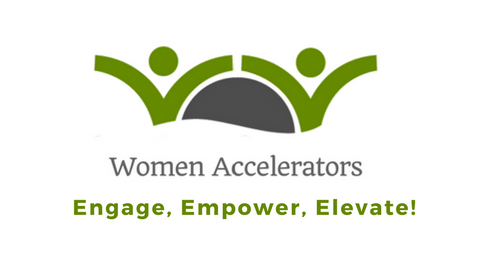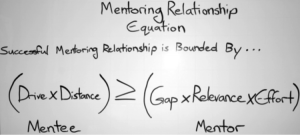de la Femme ended 2014 with the successful launch of our new mentoring program. We have an excellent panel of experienced professionals who are eager to mentor and enthusiastic mentees, excited to learn and further their professional development. Now that each mentee has a mentor, we’ll be publishing a series of blogs about how to build and foster a successful mentor-mentee relationship. We’ll start the series by discussing how one can approach their mentor and establish a solid foundation for a successful mentor-mentee relationship.
Groundwork: The Mentoring Relationship Equation
In Get the Mentoring Equation Right by Whitney Johnson of HBR, she presented Bob Moesta’s “Mentoring Relationship Equation.” This equation illustrates several key points. The motivation, or “Drive,” of the mentee to attain her goals must be great. The mentor has the experience or knowledge the mentee lacks (“Gap”) and wants to provide the “Effort” (work necessary to provide the mentee with the “Relevance,” which is the necessary experience and knowledge), but the mentee has to be self-motivated to attain her goals and aware of the work necessary to achieve her goals (“Distance”). As a mentor, a large “Gap” relative to your mentee, “Relevance” to her skillset, and the “Effort” to invest in your mentee and her development are critical to a positive mentoring experience.
Get the ball rolling SMARTly
One great way to start building productive communication and collaborative efforts is for the mentee and mentor to establish SMART goals (Lois J. Zachary and Lory A. Fischler). SMART goals are “Specific, Measurable, Action-oriented, Realistic, and Timely” and aim to accomplish key objectives (quoted here):
• Accelerate and enhance the professional or personal development of the mentee
• Represent a challenge or stretch for the mentee
• Seek a quantitative or qualitative improvement that can be demonstrated or measured
• Focus on the future development of the mentee
As a mentee, if you don’t have clear, well-defined goals in mind, or just don’t know where to start, Zachary and Fischler suggest this: “Begin with the end in mind.” If you have “starter goals,” which are defined as goals that are “not fully developed” of “not mutually agreed upon” by both the mentor and mentee, the mentee and mentor can prioritize goal setting and work together to refine and clarify the starter goals to become SMART goals. If well defined, SMART goals have been communicated and mutually established, fantastic! Continue the momentum and keep working towards attainment of your SMART goals!
We took great care to create suitable mentor-mentee pairs and are excited to learn about the successes of your relationship! January is National Mentoring Month, so be sure to thank your Mentor for all of their support and guidance!



